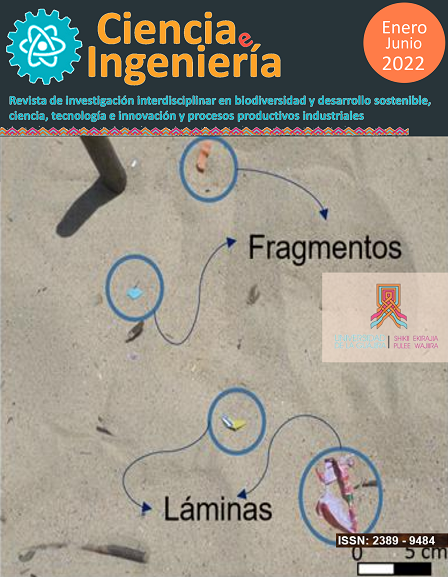Abstract
The department of Guajira is one of the 32 departments of Colombia included in the Caribbean region. It is constituted in its center by a low plain, to the south by the Sierra Nevada de Santa Marta and the gentle slope of the Rancheria and Cesar rivers. In Guajira all the thermal floors of the intertropical zone are marked with average temperatures between 35° and 40°C. In terms of hydrology, there are water deposits such as aquifers and lagoons, which are the main supply for the communities' consumption. Among the ecosystems in La Guajira is the Buenavista coastal wetland, located in the municipality of Manaure, which represents a source of health and wealth since it guarantees food supply, provides fresh water and helps us conserve the biodiversity of the planet. Therefore, this work aims to contribute to the knowledge of the fauna and flora of the department of La Guajira, provide information and serve as a baseline for the formulation of strategies in the management and conservation of coastal wetlands in the Caribbean region. Twenty-seven species of plants were dated, being the Fabales order the most representative, 94 species of birds in which Charadriiformes was the most abundant, 18 species of mammals being Didelphidae the family with the highest number of species, 18 species for herpetofauna with the highest diversity in the Colubridae family, and 27 plant species grouped in 16 families, being Fabaceae the most diverse.
References
Alcaldía Municipal de Manaure. (2002). Plan básico de ordenamiento territorial del Municipio de Manaure. Manaure.
Bernal, R., S.R. Gradstein & M. Celis (eds.). (2019). Catálogo de plantas y líquenes de Colombia. Instituto de Ciencias Naturales, Universidad Nacional de Colombia, Bogotá. http://catalogoplantasdecolombia.unal.edu.co.
Díaz, A. C., Camacho, J. H., & Cadena G, A. (1986). Lista actualizada de los mamíferos de Colombia anotaciones sobre su distribución. Caldasia, 471-501.
Duellman, W. E. (1979). The South American herpetofauna: its origin, evolution, and dispersal (Vol. 7). Lawrence, KS: Museum of Natural History, University of Kansas.
GBIF.org (2021), GBIF Home Page. Disponible en: https://www.gbif.org [13 enero 2021].
Gil-Torres W., F. G.-C. (2009). Ordenamiento ambiental de los manglares de la Alta, Media y Baja Guajira. Marquillas S.A.
Hernández, L., Ramírez, C., Orangel, J. & Ipuana, A. (2009). Plan salvaguarda Wayuu Zona sur Guajira. https://siic.mininterior.gov.co/sites/default/files/pueblo_wayuu_sur_de_la_guajira_-_diagnostico_comunitario_0.pdf
Hernández-Camacho, J., Walschburger, T., Ortiz, R., & Hurtado, A. (1992). Origen y distribución de la biota suramericana y colombiana. La Diversidad Biológica de Iberoamérica. Acta Zool. Mex.(ns). Volumen especial. CYTED-D, Programa Iberoamericano de Ciencia y Tecnología para el Desarrollo, México DF, México, 3-24.
Hilty, S. L., & Brown, W. L. (1986). A guide to the birds of Colombia. Princeton University Press.
Hostein, N. (2010). El pueblo wayuu de la Guajira colombo-venezolana: un panorama de su cultura. Cuadernos de Antropología, 20.
ICZN (1999). International Code of Zoological Nomenclature. Quarta edição. The International Trust for Zoological Nomenclature, Londres, Reino Unido. 306p
Kaufman, K. (2005). Kaufman field guide to birds of North America. Houghton Mifflin Harcourt.
Mendoza, J. E., Amaya, J. D., Terán, P., Ramos, A., Vargas, N., Cediel, M.,... & Beltrán, F. (2012). Política Nacional para la gestión integral de la biodiversidad y sus servicios ecosistemicos–PNGIBSE. Ministerio de Ambiente y desarrollo sostenibl, 1-134.
Navarro, J. F. (2000). Manual de huellas de algunos mamíferos terrestres de Colombia. Edición de campo.
ONIC. (2022). X Congreso Nacional de Pueblos Indígenas de la ONIC. https://www.onic.org.co/pueblos
Pérez-Santos, C., & Moreno, A. G. (1988). Ofidios de Colombia. Torino: Museo Regionale di Scienze Naturali.
Presidencia de la Republica. (2002). Política Nacional para Humedales Interiores de Colombia. Bogotá D.C: Panamericana Formas e Impresos. 382p
Román-Palacios, C., Fernández-Garzón, S., Valencia-Zuleta, A., Jaramillo-Martínez, A. F., & Viáfara-Vega, R. A. (2017). Lista anotada de la herpetofauna del departamento del Quindío, Colombia. Biota Colombiana, 18(1), 251-281.
Ruiz-Guerra, C., Johnston-González, R., Castillo-Cortés, L. F., Cifuentes-Sarmiento, Y., Eusse, D., & Estela, F. A. (2008). Atlas de aves playeras y otras aves acuáticas en la Costa Caribe Colombiana. Asociación Calidris. Cali, Colombia, 72.
Sistema de Información sobre Biodiversidad de Colombia - SiB (2021), Home Page. Disponible en: http://www.sibcolombia.net/ [20 octubre 2021].
Solari, S., Muñoz-Saba, Y., Rodríguez-Mahecha, J. V., Defler, T. R., Ramírez-Chaves, H. E., & Trujillo, F. (2013). Riqueza, endemismo y conservación de los mamíferos de Colombia. Mastozoología neotropical, 20(2), 301-365.
Turland, N. J., Wiersema, J. H., Barrie, F. R., Greuter, W., Hawksworth, D. L., Herendeen, P. S., Knapp, S., Kusber, W.-H., Li, D.-Z., Marhold, K., May, T. W., McNeill, J., Monro, A. M., Prado, J., Price, M. J. & Smith, G. F. (eds.) 2018: International Code of Nomenclature for algae, fungi, and plants (Shenzhen Code). Glashütten: Koeltz Botanical Books.

This work is licensed under a Creative Commons Attribution-NonCommercial-NoDerivatives 4.0 International License.
Copyright (c) 2022 Milenis Zambrano Jimenez , Geomar Molina Bolivar


